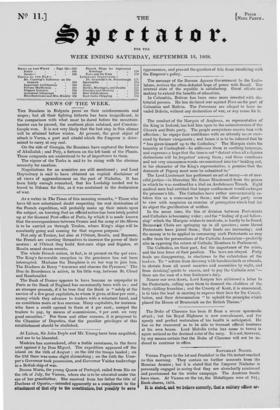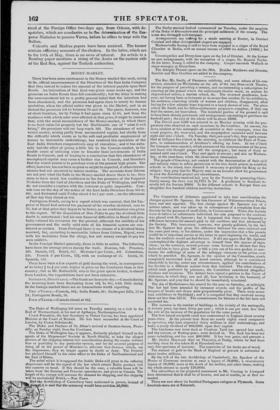NEWS OF THE WEEK.
THE Russians in Bulgaria press' on their reinforcements and sieges ; but all their fighting hitherto has been insignificant, in the comparison with what must be dared before the mountain- barrier can be passed, the southern plain subdued, and Constan- tinople won. It is not very likely that the last step in this climax Will be attained before winter. At present, the great object of attack is Varna, a port and citadel which the Emperor is deter- mined to carry at any cost.
On the side of Georgia, the Russians have captured the fortress of Akalkalak ; and Poty, a fortress on the left bank of the Phasis. These conquests are understood to be of importance to them.
The vigour of the Turks is said to be rising with the obvious necessity for exertion.
Negotiations for an armistice are still mentioned ; and Lord Heytesbury is said to have obtained an explicit disclaimer of all views of aggrandizement on the part of Nicholas. It has been fairly enough remarked, that his Lordship needed not to travel to Odessa for this, as it was contained in the declaration of war.
As a writer in The Times of this morning remarks, " Those who have till now entertained doubt respecting the real destination of the French expedition, will probably make up their minds upon the subject, on learning that an official notice has been lately posted up at the General Post-office at Paris, by which it is made known that the correspondence between France and the army at the Morea is to be carried on through Toulon, where King's ships will be constantly going and coming for that express purpose."
Not only at Toulon, but also at 1'Orient, Rouen, and Bayonne, the French are exerting themselves to increase the power of their marine : at rOrient they build first-rate ships and frigates, at Rouen armed steam-vessels.
The whole French nation, in fact, is at present on the qui vive . The King's favourable reception in the provinces has not been • interrupted. Madame the Dauphine is on her way to join him. The Duchess de Berry "traverses and charms the Pyrenees." The Due de Bourdeaux is active, in his little way, between St. Cloud and Rambouillet.
The Bank of France appears to have become as unpopular in Paris as the Bank of England has occasionally been with us ; and on stronger grounds, if it be true that the Bank is " solely at the service of a few great capitalists, to whom it gives, at four per cent., money which they advance to traders with a reluctant hand, and on conditions more or less onerous. Many capitalists, for instance who have a credit opened to them at 4 per cent., compel the traders to pay, by means of commissions, 9 per cent. on very good securities." For these and other reasons, it is proposed to the Chamber of Deputies, that the peculiar privileges of this establishment should be abolished.
At Lisbon, Sir John Doyle and Mr. Young have been acquitted, and are to be liberated.
Madeira has surrendered, after a feeble resistance, to the force sent against it by Don Miguel. The expedition appeared off the island on the 16th of August ; on the 22d the troops landed ; on the 23d there was some slight skirmishing ; on the 24th the Usur- per's Governor took possession, and Governor Valdez tookrefuge in a British ship of war.
Donna Maria, the young Queen of Portugal, sailed from Rio on the 5th of July, for Vienna, where she is to be educated under the eye of her grandfather. She received from her father the title of Duchess of Oporto,—intended apparently as a compliment to the attachment of that city to the constitution, but possibly to save appearances, and prevent the question of title from interfering with the Emperor's policy.
The message of the Buenos Ayrean Government to the Legis- lature, revives the often-defeated hope of peace with Brazil. The internal state of the republic is satisfactory. Great efforts are making to extend the benefits of education.
In Columbia, Bolivar has been once more invested with dic- tatorial powers. He has declared war against Peru on the part of Columbia and Bolivia. The Peruvians are alleged to have in- vaded Bolivia, without any declaration of war, or any cause for it.
The conduct of the Marquis of Anglesea, as representative of' the King in Ireland, has laid him open to the animadversion of the Church and State party. The people everywhere receive him with affection ; he repays their confidence with an urbanity never exer- cised by former vicegerents ; and hence it is to be inferred that he has given himself up to the Catholics." The Marquis visits his tenantry at Carlingford—he addresses them in soothing language, and expresses a hope that the time is not" distant when all religious distinctions will be forgotten" among them ; and these courteous and not very uncommon words are construed into his" holding out, in his character of the King's representative, a promise that the demands of Popery must soon be submitted to."
The Lord Lieutenant has performed an act of mercy—or of mer- ciful justice—in liberating Mr. Eneas Macdonnell from the prison in which he was confined for a libel on Archdeacon Trench. Eight medical men had certified that longer confinement would endanger the prisoner's life. The Catholics have rather unwarrantably as- taken this as a concession to them ; and the other party seem to view with suspicion an exercise of prerogative which had for its object the gratification of neither.
In the mean time, the line of division between Protestants and Catholics is becoming wider ; and the " feeling of good fellow- ship" which the Marquis wishes to inculcate, is hardly to be found. Brunswick Clubs are springing up in all quarters ; some liberal Protestants have joined them ; their funds are increasing ; and the money is to be applied in succouring such Protestants as may suffer from the persecutions of the Catholic Association—probably also in opposing the return of Catholic Members to Parliament.
The Catholics, on their part, feel the importance of the crisis, and the true force of their position. The laws are obeyed. Party feuds are disappearing, in obedience to the exhortation of the leaders. To " refrain from dressing with handkerchiefs or ribands, to abstain from all secret societies and assemblies by night, and from drinking; spirits to excess, and to pay the Catholic rent "- these are the sum of a true Irishman's duty.
Nearer our own doors, Lord Kenyon has addressed a letter to the Protestants, calling upon them to demand the abolition of the forty-shilling franchise ; and the County of Kent, it is announced, is to take the lead in meeting to express their love for the Consti- tution, and their determination " to uphold the principles which placed the House of Brunswick on the British Throne."
The Duke of Clarence has been ill from a severe spasmodic attack ; but his Royal Highness is now convalescent, and the speedy and perfect restoration of his health is anticipated. He has so far recovered as to be able to transact official business at his own house. Lord Melville (who has come to town) is again noticed as the destined ruler of the navy. It is not, however, by any means certain that the Duke of Clarence will not be in- duced to continue in office.
SATURDAY NICHT.
Vienna Papers to the 1st and Frankfort to the 7th instant reached us this morning. They contain no further accounts from the Russian Armies ; but it is stated that the Emperor Nicholas is personally engaged in seeing that they are abundantly reinforced and provisioned for the winter campaign. The Austrian funds have risen. At Vienna on the 1st, the Metalliques were at 941 ; Bank-shares, 1078.
It is stated, mad eve believe correctly, that a military officer ax- rived at the Foreign Office two days ago, from Odessa, with de- spatches, which are conelusrve as to file deterniinatioa of the Em- peror Nicholas to possess Varna, before he offers to treat with the Sultan.
Calcutta and Madras papers have been received. The former contain afflicting accounts of the cholera. In the latter, which are to the 18th of May, there is no news of interest. An article in a Bombay paper mentions a rising of the Arabs on the eastern side of the Red Sea, against the Turkish authorities.



















